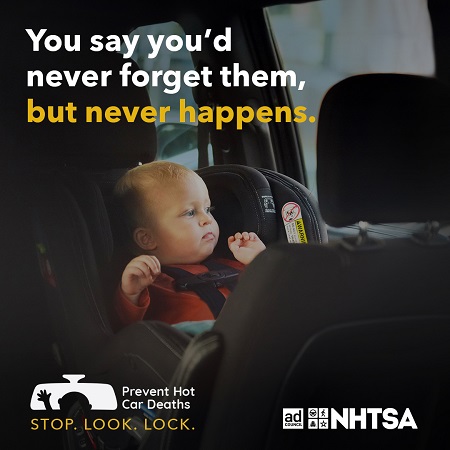As heat index climbs, Iowa parents are reminded to “Stop. Look. Lock.”
July 23rd, 2025 by Ric Hanson
(Radio Iowa) – An 18-month-old died after being found unresponsive in a vehicle in West Des Moines earlier this month, marking the eighth such hot car child death in the state since 1998. Laura Dunn, a safety specialist with the National Highway Traffic Safety Administration, says a child’s body temperature rises up to five times faster than an adult’s and can quickly reach dangerous levels in a car, even if it’s parked in the shade or the windows are open a crack.
“Parents may think that their children will never be a victim of a hot car, or that they could never forget their child, but it happens, unfortunately, to dozens of families every year,” Dunn says. “We lose on average 37 children each year to hot car deaths. We want to show parents and caregivers how this can happen and how they can also prevent it.” Studies find pediatric heatstroke can happen at temperatures as low as 60 degrees, and a child will die much more quickly if temperatures are in the 80s or 90s. 
“About 52% of these cases are when children are forgotten in a hot car, and many times we found that the biggest risk factor for parents is a change in routine,” Dunn says, “so a different parent is dropping that child off for the day, maybe there was a doctor’s appointment, there’s something different happening that day.” Dunn suggests parents make an arrangement with their childcare provider that might help prevent a tragedy. “Have that childcare provider give you a call if your child doesn’t arrive within 10 or 15 minutes of when they’re supposed to be there,” Dunn says. “Just kind of check in and say, ‘Hi, is your child supposed to be there today?’ and then have both parents check with each other and make sure they know exactly where their child is.”
Placing a child’s toy in the front seat with the driver may help to trigger their memory, or better yet, Dunn suggests putting an item you’ll need to have at work in the -back- seat with the child. “Your work bag, your purse, your phone, your badge that you need for work, anything that you need for the day,” Dunn says. “Put it in the back seat, so when you get to where you’re going, you park, you get out, you have to physically open that back door and look in your back seat and retrieve those things that you need for the day. It’s just that extra check that your child is not in the car.”
A national ad campaign aims to reinforce the message: “Stop. Look. Lock.” About a quarter of these hot car deaths are cases where the child gets inside the car themselves and can’t get out. To prevent that situation, Dunn suggests always keeping your vehicle’s doors locked and keep the keys or fob up and out of a child’s reach.





